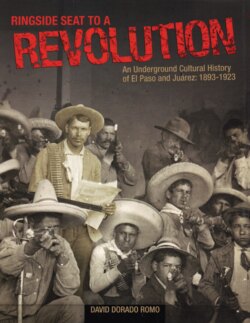Читать книгу Ringside Seat to a Revolution - David Dorado Romo - Страница 25
На сайте Литреса книга снята с продажи.
Оглавление20
Paso which would be calculated to injure the general business or reputation of
the city of El Paso.
Newspaper reporters who wrote negative articles about the city that the authorities
deemed false were to be “punished with a fine of not less than $25 nor more than $200.”11
In June 1919, the editor and business manager of El Paso’s La República were arrested
for failing to provide an English translation of their newspaper.12 They were subsequently
deported to Mexico.
Despite this kind of repression, the proliferation of radical journalism in El Paso helps
explain why the border city was such a hotbed of insurrection. On the border, journalist
and revolutionary were often synonymous. Journalists planted the ideological seeds of
rebellion. They held secret meetings in their newspaper offices. They were the first to call
for armed uprising. They drafted the insurrection’s blueprints. And usually, the periodistas
were also the first to take up arms themselves. Yet these fronterizo journalists were more
than mere agitators. Many of them lived lives full of unexpected twists and turns; they were
often revolutionary beyond just the political sense of the term.
I’ll begin my study of the role journalists played in sparking the revolution with what
may seem to be an odd choice—Teresita Urrea. Despite being listed as coeditor of El
Independiente, she was not exactly a journalist. Several articles appearing in the newspaper
were signed by her, but it’s not clear whether she actually wrote them all. She also never
publicly called herself a revolutionary. Yet she inspired journalists and revolutionaries in El
Paso for many years to come. In many ways, the revolution on the border began with her.
Broadsheet published by La
Voz de La Mujer in El Paso.
The radical feminist newspa-
per was printed by Aguirre’s
press in 1907. (Bancroft
Library, UC Berkeley.)
✯ ✯ ✯
11
El Paso Times, March 25, 1916.
12
El Paso Times, July 17, 1919.
